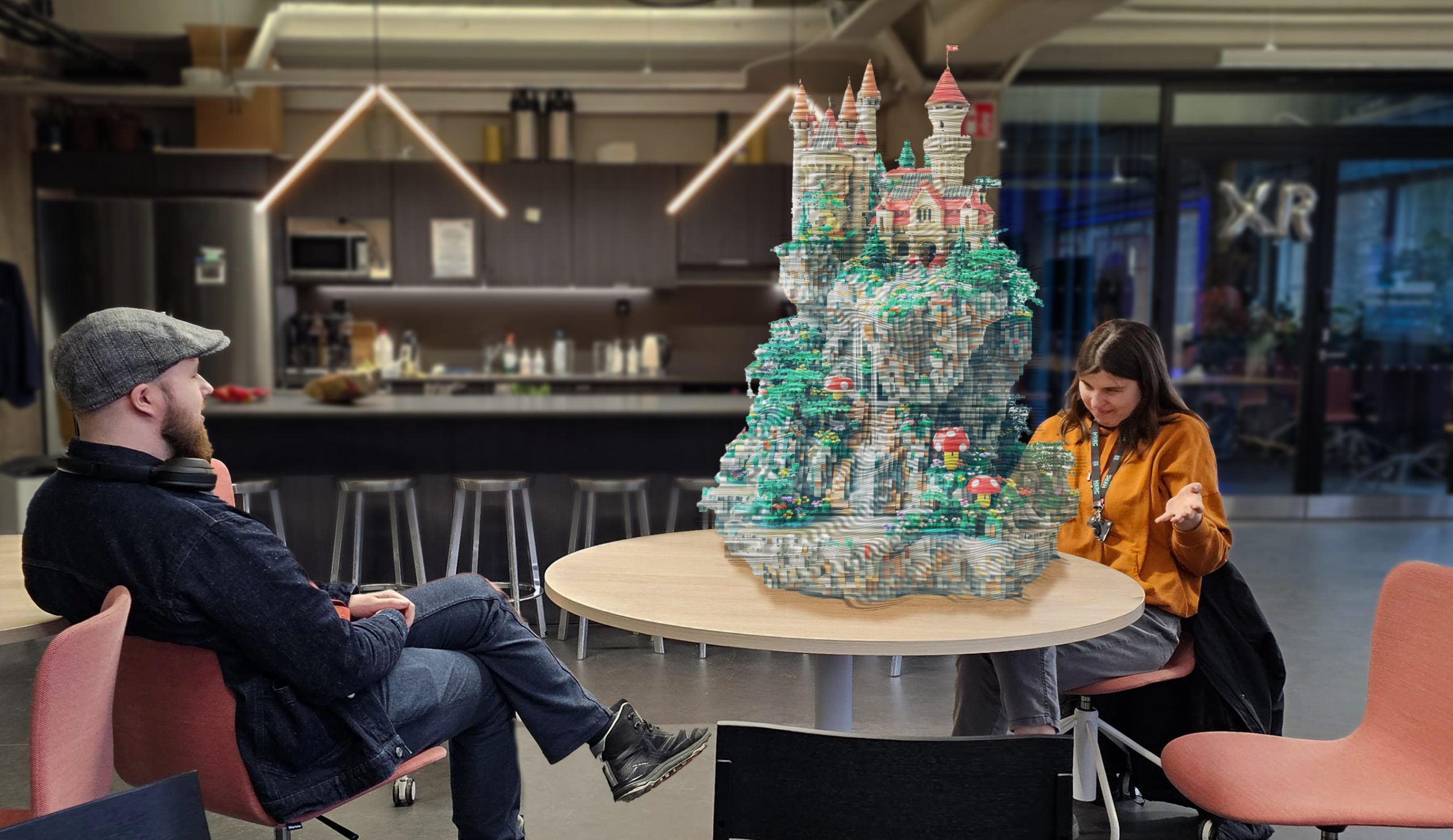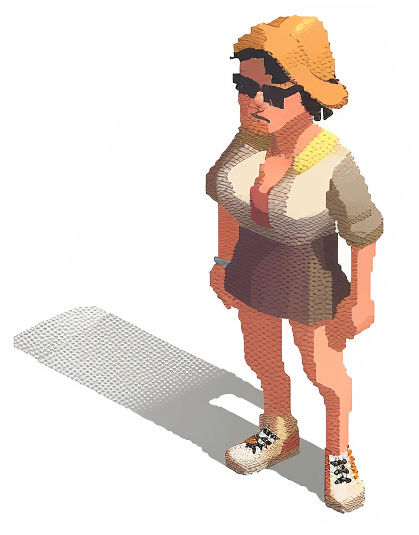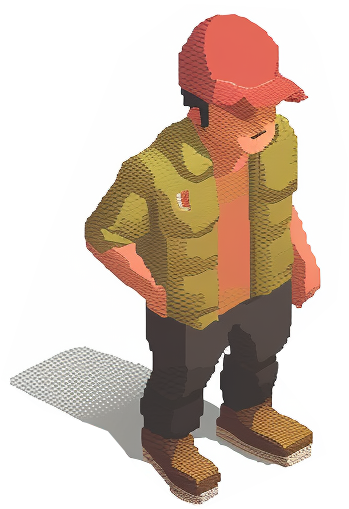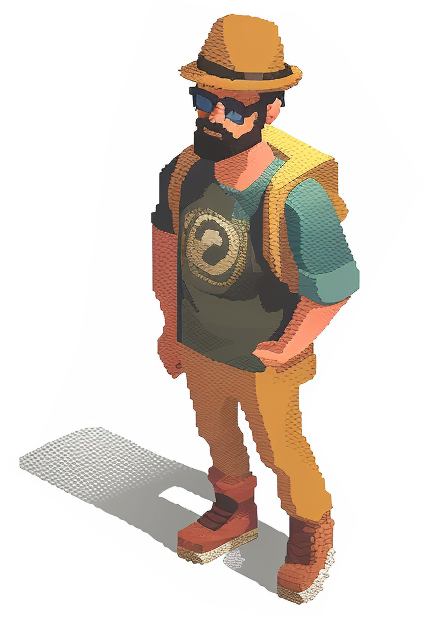In the ever-evolving world of XR and emerging technologies, new applications, devices and virtual worlds dazzle our collective imagination, however, the deeply human essence that drives innovation is often overshadowed. In this series of articles – Humans of XR – we take a step back from the cutting-edge advancements to focus on the individuals shaping the future of XR. Through conversations with professionals from various disciplines in the XR industry, we seek to uncover the personal journeys, inspirations, trepidations and hopes that drive the human experience behind the scenes.
The interview was conducted by Janset Shawash.
Today we are meeting with three trainees from Helsinki XR Center, Leevi Rantala, Kamil Řehoř and Niina Kahela, together with their team leader Emmi Isokirmo. We are making use of a rare afternoon lull in the spacious common room of the Center to sit down for some coffee and Finnish pulla pastries and an informal discussion about their personal experiences and thoughts on tech advancements in XR, as well as career paths and visions for the future of XR in Finland.
Here, in Part 2 of the interview we discuss key points such as the realities of the XR industry in Finland and the prospects for the future generations of XR developers.
Check out Part 1 for a recap on how they arrived in the field, opinions on XR, AI and emergent technologies and personal experience of their use.

Emmi Isokirmo, a 3D artist and the team lead conjuring an energy efficient castle with pure magic for Kamil Řehoř, a game developer and trainee at the HXRC.
What about your plans for your professional future? What do you think your employment prospects are like?
Leevi: I think the gaming industry is having a tough time right now. I think investors are rethinking on what they invest upon now, and as such many (either small, or just poorly managed) companies are having a tough time. But there still is a lot of money and jobs in the industry.
You can see that games are being bought in massive amounts. The gaming market is still making a lot of money. On the other hand, a lot of people are getting fired. Companies are investing that money in very poor ideas and making very poor decisions. And there aren’t many investors now.
Niina: That could also be because of the economic recession. Of course, war and political issues matter as well.
But we still have business. In Finland we also have other digital industries right now, not just games. We have high tech educational, marketing products, digital video production, business to business communication, and visualization among other things. As an artist, being in this field, there’s a lot of possibilities.

“In Finland we also have other digital industries right now, not just games. We have high tech educational, marketing products, digital video production, business to business communication, and visualization among other things. As an artist, being in this field, there’s a lot of possibilities.”
Kamil: I don’t think it will be easy to get into the employment market. It’s possible, but not easy. My plan is to apply for as many gaming companies. That was my first thought when I got into this. But now that I’m here, I see other possibilities as well.
I do also have my own business that is ongoing. So, I might do something with that in the future. There are many avenues.
And if all else fails, I’ll become an electrician or something. I would like to add that I think it’s very possible to retrain at any time.
Niina: I also don’t mind working abroad. If it comes to working at a game studio, if it was possible, I would want to go to Red Hill. And learn everything they have to offer and continue there. It seems to me the most important thing would be learning from seniors and professionals. That’s what I would want to do.
I don’t think it will be easy though. Because now senior spots are the only spots that are open.
Leevi: Junior work is scarce. No one wants to invest in junior talent. If it comes up that you need some juniors, it goes under the table. You don’t really see positions.

Kamil Řehoř, reflecting on the Omniverse.
What do you think of future generations of XR professionals? How will life be different for them?
Leevi: They will grow in an even more unstable overall global situation. They will grow into it. And they will have to live in it. It’s going to be confusing and foggy because things are changing so rapidly.
Kamil: This makes me think of Lord of the Rings, where Gandalf tells one of the hobbits, I always forget which one, when they ask him, and I am paraphrasing here: Why do we have to live in these sorts of times? And Gandalf says: It really doesn’t matter what type of times you live in. You don’t get to choose that. You just have to live the best life you can in the times you live in.
I think that is very important to always keep that in perspective. They will feel happiness. They will see positive change and negative change. And they will navigate through all of this just as we have. They will have different tools for doing it. But still, the feelings and the overall things are the same. And I think it’s really important.
“From my experience with younger people, I can see that there are differences but also parallels. But overall, I think they have more load in their shoulders. They feel like they have to be the change.”

Emmi: From my experience with younger people, I can see that there are differences but also parallels. But overall, I think they have more load in their shoulders. They feel like they have to be the change. I believe, in general, they should stay interested in the new digital tools. And they should apply critical thinking to everything they see.
What would you advise the next generation of XR professionals?
Emmi: Talking about how hard it is to find a job as a junior, we should remember that as a senior it’s going to be a lot easier. So, you have to remain really interested and active until you reach that stage. This is about passion, and this is not a career where you just get certified by a school, and you find a position in a company right away. The school is there to help you realize your passion, and you will find others who are also passionate about it.
Leevi: You have to educate yourself independently as well. One should also consider freelancing, as it makes it easy to apply your skills and create productive work, so there is a lot of financial freedom available through the internet and digitalization.
Kamil: I find it most helpful to attend actual physical events. To maintain a general human experience and connection, one should go to physical events as much as possible and try to keep them alive. This is especially important after Covid, as we developed this sense that we can “unphysicalize” and we can make things cheaper if it’s just digital, but there’s also a counter movement to that. As for the digital spaces, I think Discord is a great place to find communities that are active, and you can get a lot of information. Especially in Finland, the industry is small, so knowing even one person in the industry can take you far in getting to know more people if you actively try.

“There is also this idea that you have to find this thing that you’re passionate about fairly quickly. I think that is a big myth!”
Kamil: There is also this idea that you have to find this thing that you’re passionate about fairly quickly. I think that is a big myth! You don’t have to find your direction too fast. You can find something that you like, try it, if you do something that you enjoy there is a good chance that even if it’s not directly related to XR it could lead you there.
You should approach everything with an open mind, and think how to apply your abilities, because things might shift throughout your life. For example, there’s a good chance that in 20 years none of us will work in XR, there’s so much time in your life that even though it’s finite there’s still enough time for you to switch and change and have opportunities that put you on a completely different track. So never feel discouraged that the one thing that you tried didn’t work.
Emmi: When talking about passion it’s not a bad thing if your passion changes. It’s not a failure. It’s supposed to be fun. As a small child, every person is asked: “what do you want to be when you grow up,” and I personally had a lot of trouble with those questions because, unlike me, everybody seemed to be so sure: “I want to be a policeman or I want to be a firefighter”.
Interviewer to Emmi: How about now? Do you know what you want to be?
Emmi: I’m not sure, I’m just here.
Interviewer to Leevi & Kamil: What about you, do you know what you want to be?
Leevi: I’m happy where I am!
Kamil: Mmm, I don’t know!
Check out Part 1 if you missed it, for a recap on how the trainees arrived in the field, opinions on XR, AI and emergent technologies and personal experience of their use!
This interview has been edited and condensed for clarity.
Disclaimer: The opinions expressed in this interview are solely those of the interviewee(s) and do not reflect the views or positions of the Helsinki XR Center or its affiliates. This article is intended for informational purposes only and should not be taken as representative of the Helsinki XR Center’s official stance or policies.
Find more of our news in the News section.
Follow us on social media for more posts: Facebook | LinkedIn | Twitter | Instagram
